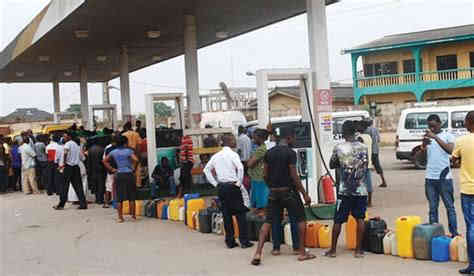Oil marketers in Northern Nigeria have made a projection that the pump price of petrol could potentially surpass N700 per litre, starting from the month of July.
According to Mike Osatuyi, the National Controller Operations of the Independent Petroleum Marketers Association of Nigeria, there is a possibility of fuel prices surging to over N700 in the northern region. This escalation is anticipated to occur once independent marketers commence importing petroleum products starting from July.
Read Also APC chieftain advises Tinubu on what to do with fuel subsidy funds
In a recent statement, he highlighted the stark disparity in petrol prices across different regions of the country. According to him, individuals residing in the northern states may find themselves shelling out a staggering N700 or more for a single litre of petrol. Meanwhile, those outside the bustling city of Lagos should brace themselves for a slightly lower price tag of approximately N610. As for the residents of Lagos, they can expect to pay around N600 per litre, further emphasising the varying costs of this essential commodity.
Okezie Ikpeazu partners with NNPCL to build modular refineries
According to my observations, the current price of crude oil stands at approximately N600 and above, with variations depending on factors such as the exchange rate, the prevailing market conditions, and the landing cost. According to the speaker, individuals residing in Lagos can expect to pay approximately N600, whereas those residing outside Lagos will pay around N600 or more. Meanwhile, individuals residing in the northern region of the country will be subject to fees starting from N700 and potentially higher.
The downstream sector is eagerly anticipating the arrival of new petroleum products as the Nigerian Midstream and Downstream Petroleum Regulatory Authority diligently grants licences to operators interested in entering the importation business.
Dollar to Naira exchange rate as of June 29, 2023
In an exclusive interview with The PUNCH on Tuesday, Olufemi Adewole, the Executive Secretary of the Depot and Petroleum Products Marketers Association of Nigeria, revealed that the Nigerian Maritime Administration and Safety Agency (NMDPRA) is presently in the process of granting licences to additional importers.
In a recent statement, he revealed that preparations are underway at full throttle to ensure the availability of new products starting in July. Moreover, he emphasised that the prices of these products will be determined based on the prevailing market conditions.
Inquiring minds wonder: From whence do countries such as Ghana, Benin, and Cameroun source their diverse array of products? “Is it not from Nigeria?” he inquired, alluding to the illicit transportation of goods from Nigeria to its neighbouring nations.
Nigerian newspaper headlines as of June 29, 2023: 10 things you need to know
The determination of product prices hinges on market fundamentals, with the current situation highlighting a delay in the arrival of certain AGO (diesel) vessels by the Nigeria Customs Service due to the imposition of a 7.5 percent VAT.
In a noteworthy reminder, it should be duly noted that any expenses borne by marketers will ultimately be factored into the overall landing cost, subsequently influencing the final price at the pump. According to the individual, the marketer’s responsibility would extend beyond mere addition of profit, as they are required to generate profit.
In an exclusive conversation on Monday, Tunji Oyebanji, a distinguished figure who previously held the position of Chairman at the Major Oil Marketers Association of Nigeria, as well as currently serving as the Chief Executive Officer and Chairman of 11 Plc, shared some intriguing insights. Oyebanji revealed that consumers should brace themselves for an imminent adjustment in pump prices, which are anticipated to align closely with the rates of diesel. Furthermore, he emphasised that neighbouring African nations, which also rely on petrol imports, will serve as a benchmark for these forthcoming price changes.
According to a recent investigation conducted by The PUNCH, it has been revealed that the cost of one litre of petrol in countries such as Ghana, Cameroun, and Benin has already surpassed the N800 mark as of June 19th.
What is Contactless Payment? 15 facts you need to know about the new CBN Policy
In Nigeria, the price of petrol is currently hovering around N495 and above, while diesel is rapidly approaching N800 per litre.
In analysing the current situation, it becomes apparent that by examining the petrol prices in other West African nations that engage in petrol imports, one can gain insight into the potential future price. In light of the current price disparity, it appears that we have not yet reached a comparable level. According to the individual, an additional factor to consider is the present cost of diesel fuel.
According to Oyebanji, there is a possibility of a price reduction based on the fluctuating exchange rate.
In a stunning development, it has been revealed that there will indeed be a significant adjustment in price. The future of the market remains uncertain as it teeters on the brink of volatility. While there is a possibility of an upward trajectory, experts caution that a downward spiral could also be in the cards, contingent upon the ever-fluctuating exchange rate. In a promising turn of events, the proliferation of products would be widespread, ensuring easy accessibility for consumers. A noteworthy advantage lies in the competitive nature of the market, as individuals are compelled to compare prices with neighbouring filling stations. Consequently, should one’s prices prove higher, the natural course of action would be to lower them, thus enticing customers to patronise their establishment. In a statement, the individual expressed their belief in the positive impact of healthy competition on the market.
During a recent conversation with The PUNCH, Osatuyi referred to the current petrol price as a “transitional price” and expressed the anticipation of marketers for a roadmap from the Federal Government in response to the removal of subsidies.
The Federal Government is anticipated to unveil its roadmap subsequent to the meeting held with labour. In a bold move, the Labour party has issued an ultimatum to the government, granting them a mere two months to devise a comprehensive roadmap. Anticipation Mounts for Release of Roadmap to Enhance Utilisation of Compressed Natural Gas
In a recent development, it has been confirmed that three marketers are set to commence the importation of products as early as July. At that pivotal moment, the true cost of goods would be unveiled, as it is certain to experience a significant surge. According to the individual in question, the current price is merely a temporary price point.
In the wake of the Federal Government’s recent announcement regarding the deregulation of the downstream market, the prices of petrol have experienced a significant surge. Stations affiliated with the Major Oil Marketers Association of Nigeria have witnessed prices surpassing N490 per litre, while IPMAN stations across the nation have seen prices exceeding N500 per litre.
In an exclusive interview with The PUNCH, the Chairman of the Independent Petroleum Marketers Association of Nigeria (IPMAN) Satellite Depot revealed that despite recent developments in the petroleum industry, marketers are steadfastly adhering to the government-regulated price of N496 per litre for their product loadings.
In the country, there exists a current supply of products being loaded at a government-regulated price of N496.50 per litre. In light of the recent forex policy implemented by the central bank, the Nigerian naira has experienced a significant surge, reaching approximately N765 per US dollar. In a statement, he expressed that the true impact of the new policy on our business remains uncertain until the arrival of fresh products.
In a recent statement, Oyebanji, a prominent figure in the industry, alluded to the fact that depot owners have begun exploring alternative avenues to secure funds for importation, including both domestic and international loans.
In the pursuit of importation licences, it is important to note that our efforts extend beyond mere acquisition. After obtaining the necessary licencing, our company made the decision to halt imports due to a lack of profitability.
In the current climate, there is a collective effort underway to determine the extent of our capabilities. In a bid to secure funds for their ventures, individuals are exploring various avenues, including seeking financial support from international sources and local banking institutions. Multiple companies are actively engaged in the process of importing products, surpassing the initial count of three. “We will not be making any public announcements regarding this matter,” he stated.
In a recent development, it has been reported by Reuters that the decision to eliminate fuel subsidy in Nigeria has had far-reaching consequences. Black market fuel vendors and commercial drivers in neighbouring countries such as Cameroon, Benin, and Togo have been hit hard, as their businesses have crumbled under the weight of scarce supplies and exorbitant prices.
In the bustling city of Cotonou, known as the commercial hub of Benin and located approximately 60km away from Nigeria, a concerning situation has unfolded. Long lines of vehicles have been forming at authorised petrol stations, causing a significant strain on their capacity to cater to the sudden and overwhelming increase in demand. This surge in fuel requirements is primarily driven by the local motorcycle-taxi operators, commonly referred to as ‘zemidjan’.
According to Janvier, an employee at the JNP fuel station, there has been a significant increase in daily sales. Previously, the station was selling approximately 2,000 litres per day. However, the current figures indicate a remarkable surge, with sales reaching up to 7,000 litres per day. In a frustrating turn of events, the individual in question found themselves in the unfortunate position of having to turn away not one, not two, but a total of four customers. The reason behind this disappointing outcome? A depletion of supplies, leaving the establishment unable to fulfil the demands of its eager clientele.
According to Janvier, the zemidjan-men are engaged in a fierce battle to be served.
According to a report by Reuters, contraband fuel vendors in the neighbouring nations of Benin and Togo, located to the west of Nigeria, have experienced a significant decline in both their supplies and customer base. Conversely, official petrol stations that were once relatively quiet have now witnessed a sudden surge in activity.
In a recent development at the Hilacondji border crossing, situated between Togo and Benin, a number of illicit fuel stalls have been forcefully closed down. Meanwhile, at the remaining stalls, vendors anxiously await the arrival of potential fuel deliveries, their stalls adorned with rows of vacant plastic jerricans.
According to the report, Ayi Hilla, a seasoned contraband fuel vendor with a decade of experience, revealed a notable shift in the activities of black marketers. Hilla disclosed that numerous individuals in this illicit trade had transitioned into alternative livelihoods such as fishing or engaging in small-scale enterprises.
In a scathing critique, energy expert Bala Zaka has taken aim at the Federal Government’s decision to deregulate the downstream sector. Zaka, a prominent figure in the field, expressed his disapproval of the government’s move, highlighting potential negative consequences that may arise as a result.
In the lead-up to May 29, a significant number of individuals struggled to grasp the concept of deregulation, as I endeavoured to elucidate its meaning. In a recent analysis, it has been suggested that Nigeria’s economy may not be sufficiently robust to support the implementation of deregulation measures. The highly anticipated Dangote refinery, a major industrial project, is located in a strategic location. Since its commissioning, has the process of refining begun?
“’The Nigerian currency, the naira, has experienced a significant decline in value. The currency in question has experienced a significant devaluation, with its value now nearing N900 on the black market. In the not-so-distant future, the cost of basic necessities may become increasingly unattainable for the average individual. A concerning development is that, even prior to embarking on a journey from one’s residence to Kara along the Ibadan/Oshodi Motorway, a significant portion of fuel reserves would have already been depleted.
In a concerning development, individuals who dare to question the practises of oil marketers now face the threat of legal action being taken against them. In a startling revelation, it has come to light that industry giants such as IPMAN and MOMAN may be prioritising profit maximisation over the welfare of the general public. This concerning development raises questions about the true intentions of these influential entities. In a potentially contentious scenario, individuals such as ourselves expressing our views may be perceived as a form of dissent against the governing authorities. In a stark reality that highlights the growing disparity between wages and the cost of living, the minimum wage falls woefully short of affording even the most basic of necessities, such as a simple bag of rice. In a statement, the individual expressed their longstanding opposition to complete deregulation.
In a recent statement, Tella Sheriffdeen, a distinguished professor of Economics at Olabisi Onabanjo University, has offered valuable advice to the government. He strongly recommends the activation of local refining as a crucial step towards achieving economic stability and self-sufficiency.
In a noteworthy development, it has been observed that the depreciation of the Nigerian naira, which is now determined by market forces, is anticipated to have a significant impact on oil prices, causing them to rise. The government is taking a firm stance on oil importers, aiming to prevent any potential collusion with economic parasites who may seek to exploit the situation by inflating prices and pressuring the government to reinstate subsidies.
In a second crucial point, it is imperative for the government to emphasise the importance of domestic productivity within the refineries and the esteemed Dangote company. In a recent statement, the individual expressed their belief that the government should have a contingency plan in place to ensure the availability of fuel through various means.









